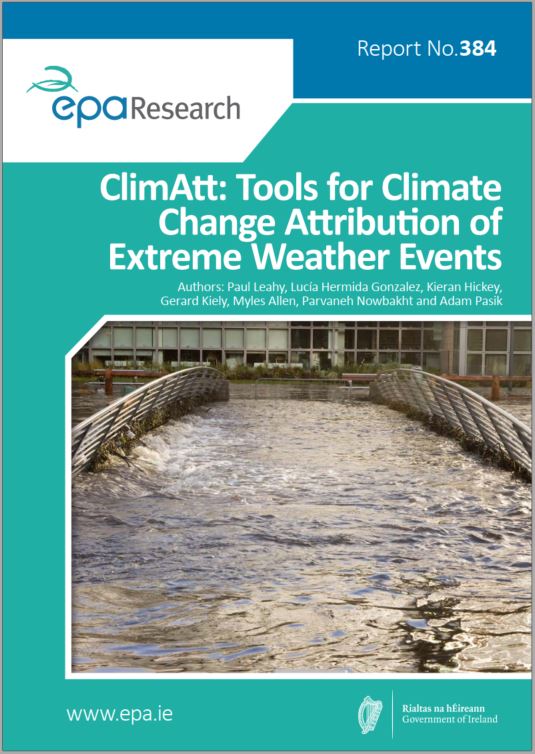Research 384: ClimAtt: Tools for Climate Change Attribution of Extreme Weather Events
Authors: Paul Leahy, Lucía Hermida Gonzalez, Kieran Hickey, Gerard Kiely, Myles Allen, Parvaneh Nowbakht and Adam Pasik
Summary: Extreme weather events, such as heavy or prolonged rainfall events, droughts and heatwaves, have the potential to cause significant social and economic disruption in Ireland. The ClimAtt project has examined the state of the art in climate change attribution of extreme weather events. Met Éireann’s observational records have been used to test and validate several climate model datasets for attribution purposes. The most appropriate datasets and methods to use to investigate the influence of climate change on extreme weather events occurring in Ireland have been recommended.

Identifying Pressures
Extreme weather events, such as heavy or prolonged rainfall events, droughts and heatwaves, have the potential to cause significant social and economic disruption in Ireland. The most damaging impacts of climate change may be due to changes in the frequency or severity of such extreme events, rather than changes in average weather conditions.
It is important that the public and decision-makers understand how climate change is influencing weather variability and extremes. Following the occurrence of an event associated with extreme weather, such as a flood, the media may ascribe the event to climate change, even in the absence of any underlying scientific evidence.
The field of probabilistic event attribution has developed rapidly in the last two decades. It allows for the influence of climate change on specific extreme weather events to be calculated, based on evidence from climate models. This allows for better understanding of the drivers of such events and, more importantly, predictions of how often similar events may occur in future decades as the Irish climate continues to change.
Informing Policy
Policymakers have become familiar with the effects of climate change on mean climatic conditions, for example average monthly temperatures in summer. However, climate change also affects the occurrence of extreme values for rainfall, temperature and other variables. This project found that many of the most damaging extreme weather-related events experienced in Ireland are due to prolonged heavy precipitation or cold spells. The known financial losses from 17 events between 1980 and 2018 amounted to almost €3 billion.
The damage may be mediated by human responses to the events; therefore, having detailed knowledge of the present and future likelihood of such events occurring will lead to better levels of preparedness and a more resilient society.
A move to evidence-based attribution of the impacts of extreme weather events to climate change will lead to a more informed public debate about the costs of anthropogenic climate change and the risks associated with future occurrences of similar events. It will also provide valuable information to support and future-proof climate adaptation plans and infrastructure, such as flood relief schemes or water supply upgrades.
Developing Solutions
Ireland’s climate is heavily influenced by the sea. An appropriate set of climate change attribution data, tools and methods is therefore important in order to investigate the influence of climate change on extreme weather events experienced in Ireland, such as Storm Ophelia in 2017 or the widespread floods of November 2009.
The ClimAtt project has examined the state of the art in climate change attribution of extreme weather events. Met Éireann’s observational records have been used to test and validate several climate model datasets for attribution purposes. The most appropriate datasets and methods to use to investigate the influence of climate change on extreme weather events occurring in Ireland have been recommended.
A case study of the November 2009 floods in south-western Ireland found no evidence that the rainfall in the days before that particular event was made more severe, or more likely, as a result of climate change.
Further work should examine the role of climate change in multiple extreme events whose effects may combine over time to create significant damage such as widespread floods, droughts, or deficits in agricultural production.
https://www.epa.ie/media/epa-2020/research/epa-funded-research/Report-cover-384.jpg